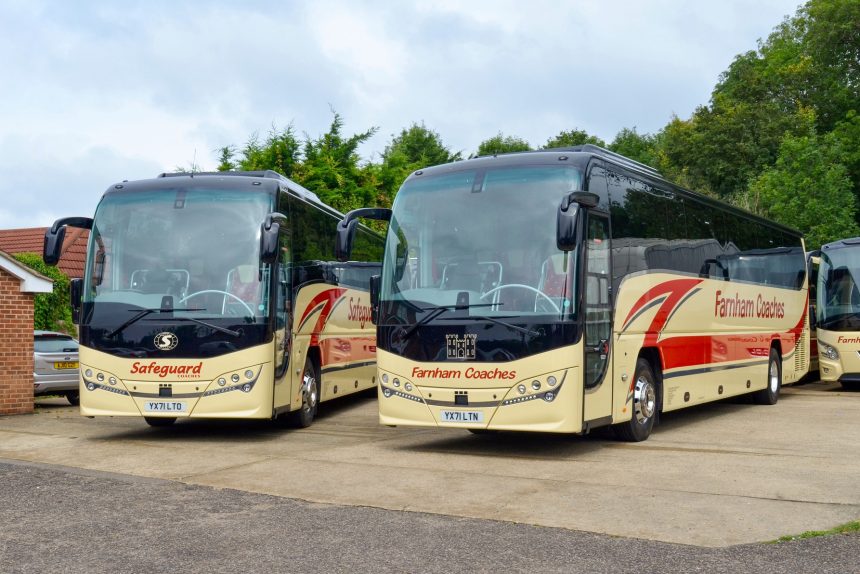An anniversary serves two purposes for those that observe them: To celebrate the past and look to the future. Both are true for Guildford operator Safeguard Coaches, which marks 100 years of business in March.
All of that has been in the ownership of the Newman family. With a century on the board, Safeguard can draw parallels between the beginning and its current business in coach and bus, but it can also highlight many changes. A disproportionate number of the latter have come in recent years and Managing Director Andrew Halliday points out that today’s Safeguard is significantly different even to the company of 2017, let alone that from 1924.
Most obvious is the primary operating centre. Based since inception close to Guildford town centre, Safeguard moved in 2018 to larger premises at Jacobs Well, around two miles north. The associated Farnham Coaches brand – which uses its own O-Licence but is part of the Safeguard business – has remained more constant, but the need for change in Guildford was obvious, says Andrew.
By 2017, Safeguard’s coach work was growing. The previous base was constrained and required vehicles to exit by reversing. Complementary space had been rented nearby, but the Jacobs Well site was then vacated by its previous tenant. An outright purchase by Safeguard followed, and it is now a modern and capable home.
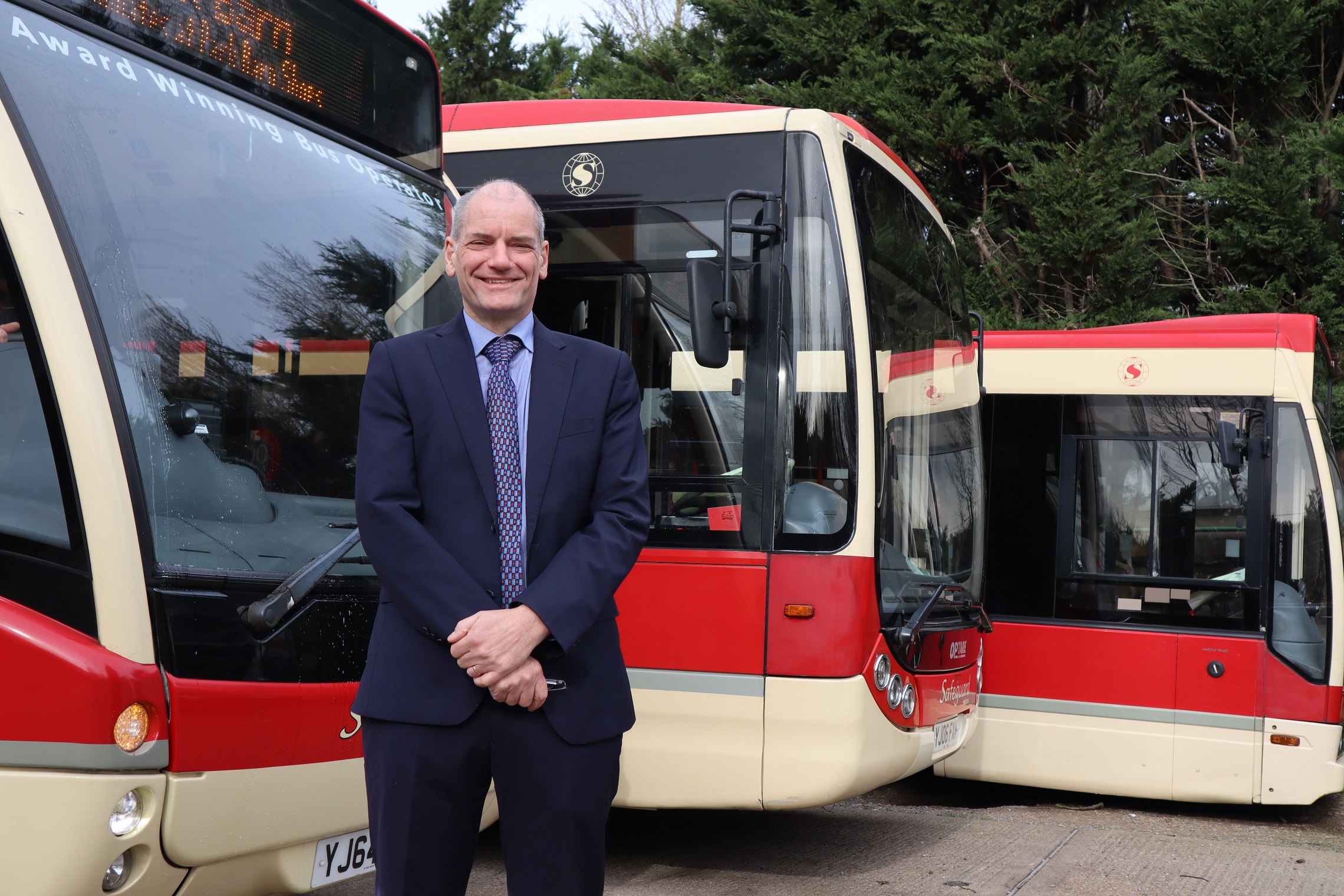
Soon afterwards began a development that – while not obvious at the time – would lead to growth of Safeguard’s bus fleet. Arriva registered competing services over the core corridor to Park Barn estate in a move that Andrew describes as “going right over the top of us.”
Safeguard responded with a registration against Arriva on another route, but the situation was clearly unsustainable. In late 2019, Arriva withdrew from competition with the independent, leaving one of what had been the group’s own services to Safeguard. Other contracted work followed, and an eight-bus peak vehicle requirement had become 11.
Will coaching buoyancy remain?
Meanwhile, Safeguard’s coaching operation continued as normal until the hard stop of March 2020. Since then, the coach fleet has been trimmed, but how vehicles are used has changed. Much the same mileage as before is covered, and coaches are worked harder. That has cut over-capacity at quieter times and enables rates and utilisation to be maximised in other periods.
Despite a drop in fleet total, the coaching arm is again buoyant. A pair of new Plaxton Panther-bodied Volvo B8Rs arrived in 2021, and two Leopards on the same chassis are imminent. The latter will be Safeguard’s first PSVAR compliant coaches, reflecting its position in that sector as a largely private hire-based business.
Because of a rapid return of coach activity, 2023 was Safeguard’s strongest year in memory, Andrew continues. Some of that was because of “a backlog in demand,” he notes; a regular summer school customer from the United States hired more coaches than ever before last summer, although it will return to a normal number this year.
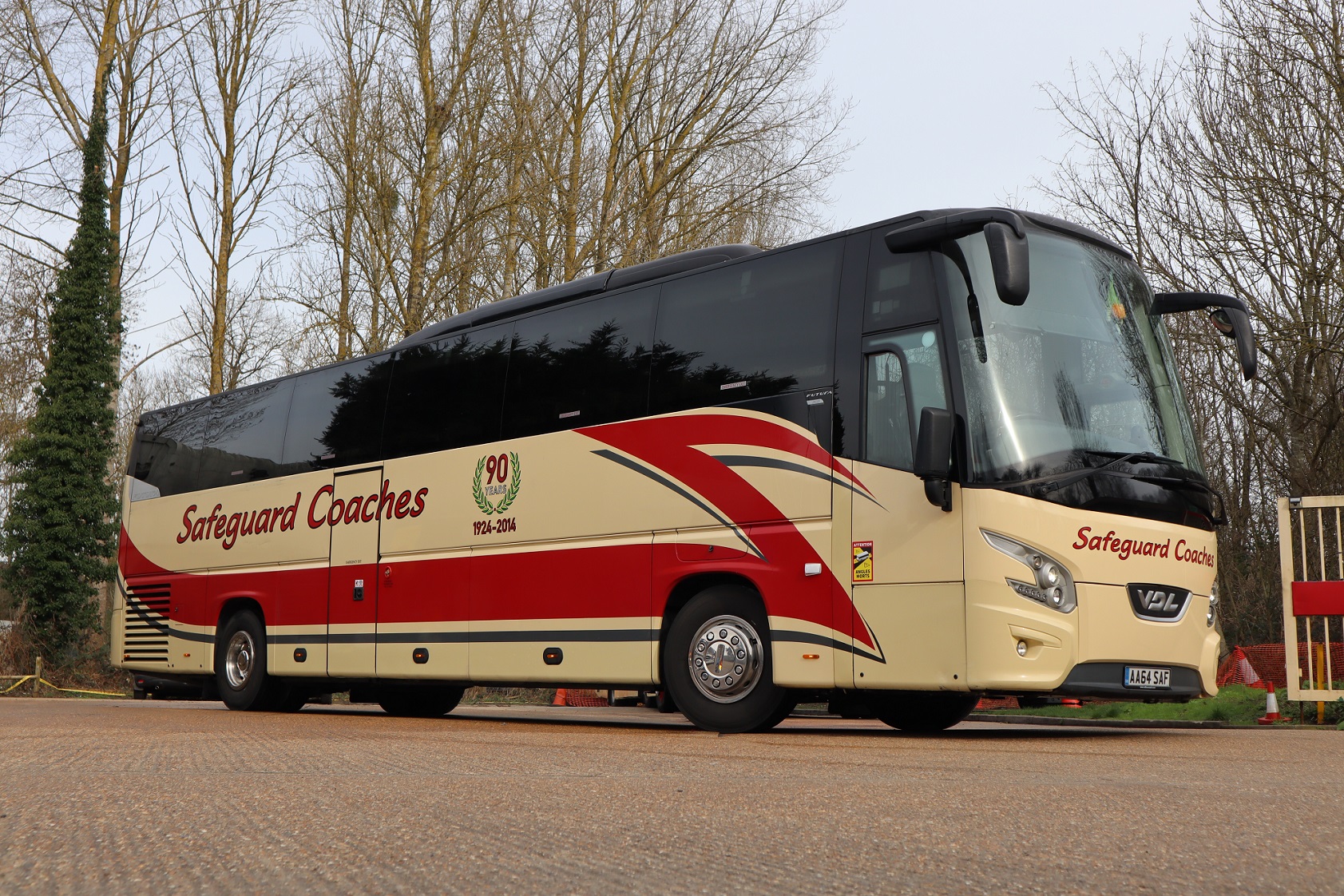
Such action from that client reflects what Andrew believes may be a trend in the coach industry over coming years. Like others, Safeguard has seen excellent rates since 2021. “I ask myself: ‘Can they keep going up?’ I suspect not, and that what we can charge will eventually plateau,” he suggests. A consideration is sensitivity to global events of incoming visitors from North America, and so matters in Ukraine and the Middle East could moderate their numbers.
Investment in fleet coming strongly for Safeguard Coaches
Nevertheless, Safeguard now earns around the same revenue from 16 coaches as it did from 27 in 2019. Its bus operation is also in a stronger position. When compared like-for-like, that part of the business has seen patronage regain pre-pandemic levels. While concessionary travellers have not returned in full, they have been balanced out by growth among farepayers.
When the fallout of a bus war and two coaching seasons hit by restrictions are considered, Andrew believes that Safeguard has seen almost as much change over the past six years as it did in the 94 that preceded them. Painful as the abrupt stop to coaching was, it allowed that part of the business to reposition itself. Government support of bus services, and Arriva’s exit from Guildford in 2021, have seen the bus network to stabilise. Both are reflected in significant fleet investment.
“We seized the moment,” he continues. “I believe that is important for all companies when the need presents itself. Many do, but not all.
“The obvious question in response is ‘why did you not do that sooner?’ It would have been much more difficult without the events of 2020; we were forced into it, although it probably is something that we should have done earlier.”
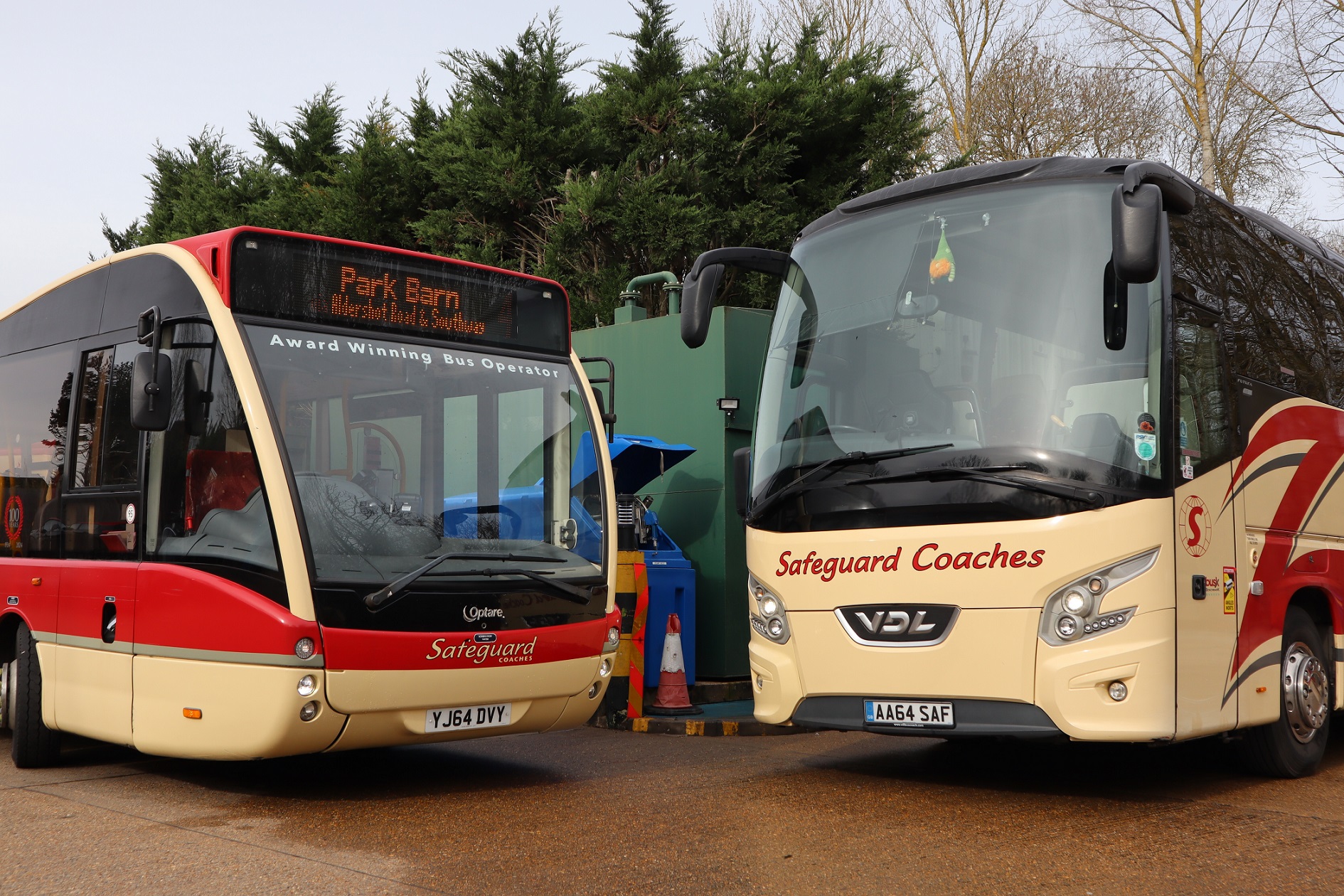
Safeguard has also significantly raised drivers’ pay, a move that has gone some way to mitigating shortages although not solving them entirely. Nevertheless, ‘churn’ of drivers has fallen, although Andrew notes that shortages are certainly not a new phenomenon for the industry.
The Volvo B8 range is the chassis of choice. In coach, the new Leopards will join three existing examples and the Panthers to take to seven the number of B8Rs in use. For bus, the B8RLE with MCV Evora body is in favour. Five have joined since 2022, and Andrew does not rule out more.
One thing Safeguard has not done is participate in the £2 bus fare cap in England. Andrew is clear on the reasons why. A strategy for eventual exit from the scheme is his primary concern.
Family company built on decades of experience
While the future looks positive for Safeguard, if not somewhat different from the recent past, Andrew gives credit to the Newman family for the business’s longevity. Despite the operator’s relatively compact nature, they have long subscribed to the approach of bringing in outside talent to run things.
Andrew arrived in 2001 to head commercial matters and brought with him experience of much larger undertakings. His career began in the London Transport graduate training scheme, saw a sandwich year with Eastbourne Buses as part of his Aston University transport management degree before that, and later moved into consultancy before settling at Safeguard.
While in London, Andrew spent time at the Westlink bus operation. Unlike others created in readiness for privatisation, Westlink adopted a highly commercial approach, thanks largely to its MD of the time. It is perhaps because of that grounding that Andrew opposes the £2 capped bus fare; he is firmly of the belief that a deregulated market should set its own rates.
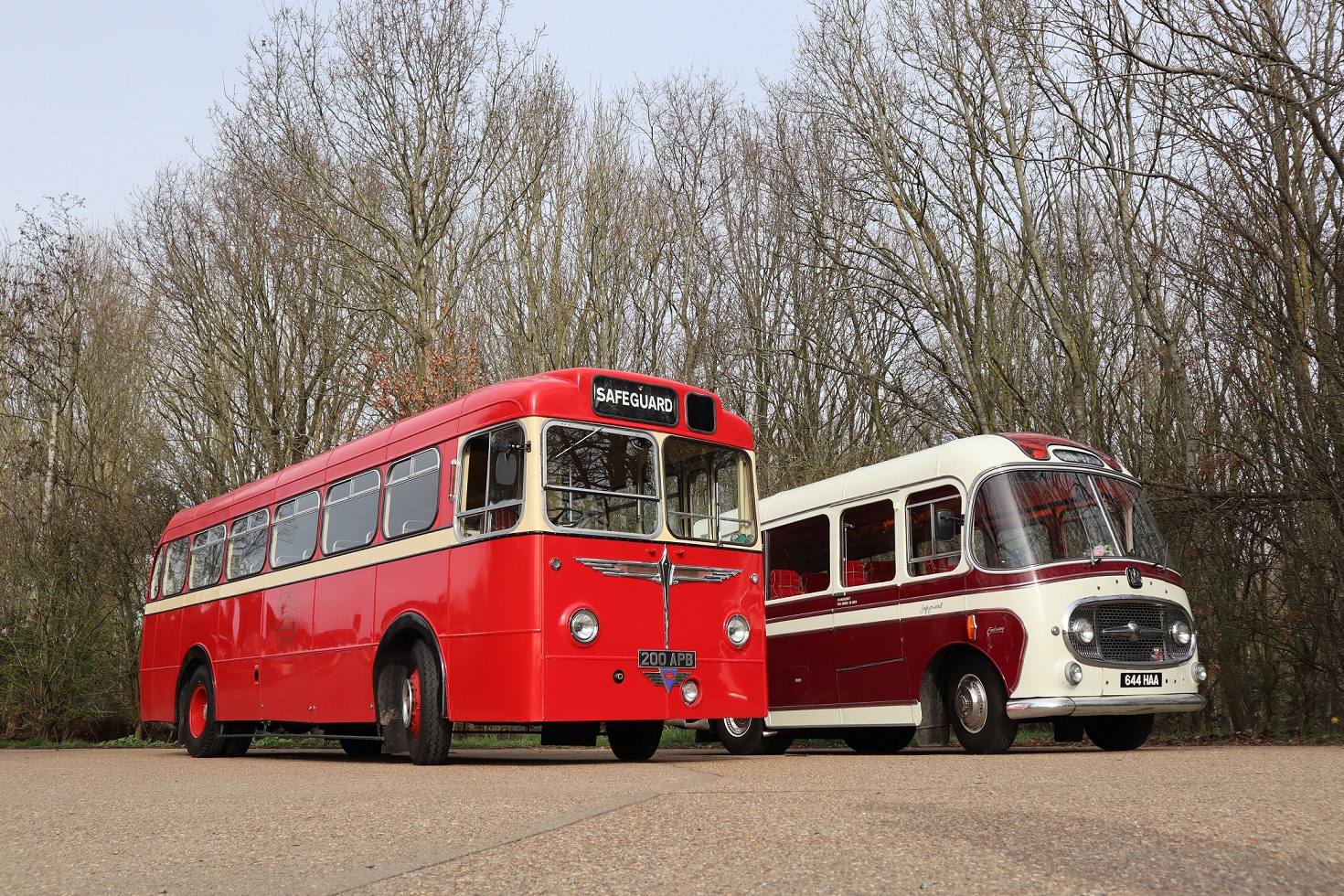
Moving from a large operator to a family-owned business has proved successful for him and Safeguard. While much talk around the industry is of the future, and for bus how the regulatory environment may change, Safeguard retains an eye on its past.
The company’s preserved AEC Reliance with Burlingham bodywork is a well-known heritage fleet member, and it recently gained a little sister. The newcomer is in fact another returnee in a Bedford J2 with Plaxton Embassy body that was operated by Safeguard until 1968. It was repurchased from Empress Coaches of Hastings in restored form. Like the Reliance, the J2’s Class VI MoT means that it can be used for private hire.
Looking to the past and the future at Safeguard Coaches
Significant work has gone into preparing for Safeguard’s centenary. Saturday 16 March will see a public event at Guildford Cathedral, while that evening a civic gathering will be held. At the same time, a commemorative booklet will be released. Proceeds will go to a local cancer charity, chosen by Safeguard after the death of Engineering Manager Brett Lambley in 2023.
Beyond the celebrations, Andrew is hopeful of a more stable period than has been the case of late, although he notes that PSVAR in the coach industry and the Accessible Information Regulations for bus mean that things will not quieten down entirely.
“Whether the future will be calmer, nobody can say, but we do not expect to make any further dramatic changes as things stand,” he continues. “We are hoping for more of what we have already, while constantly making steady progress.”
Strong foundations, committed owners and financial stability have combined with willingness to adapt when necessary to leave Safeguard looking ahead positively as it marks its centenary. “We will celebrate on 16 March – but after that we will get on with the day job once again,” Andrew concludes.













